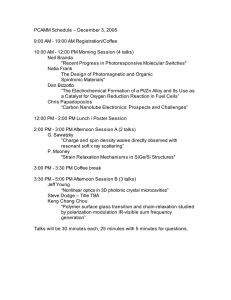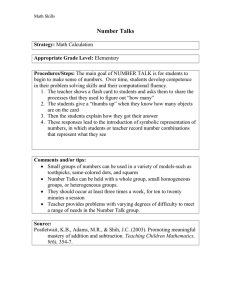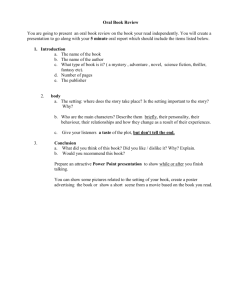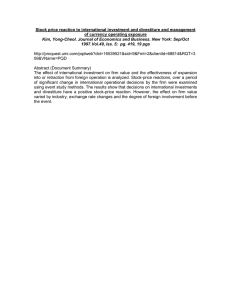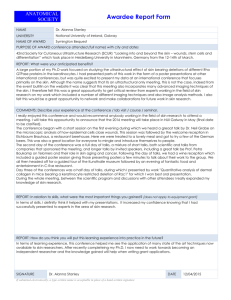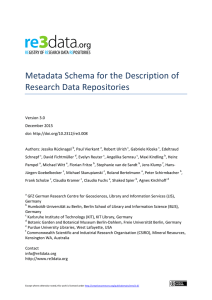Walied El Hag Ali
advertisement
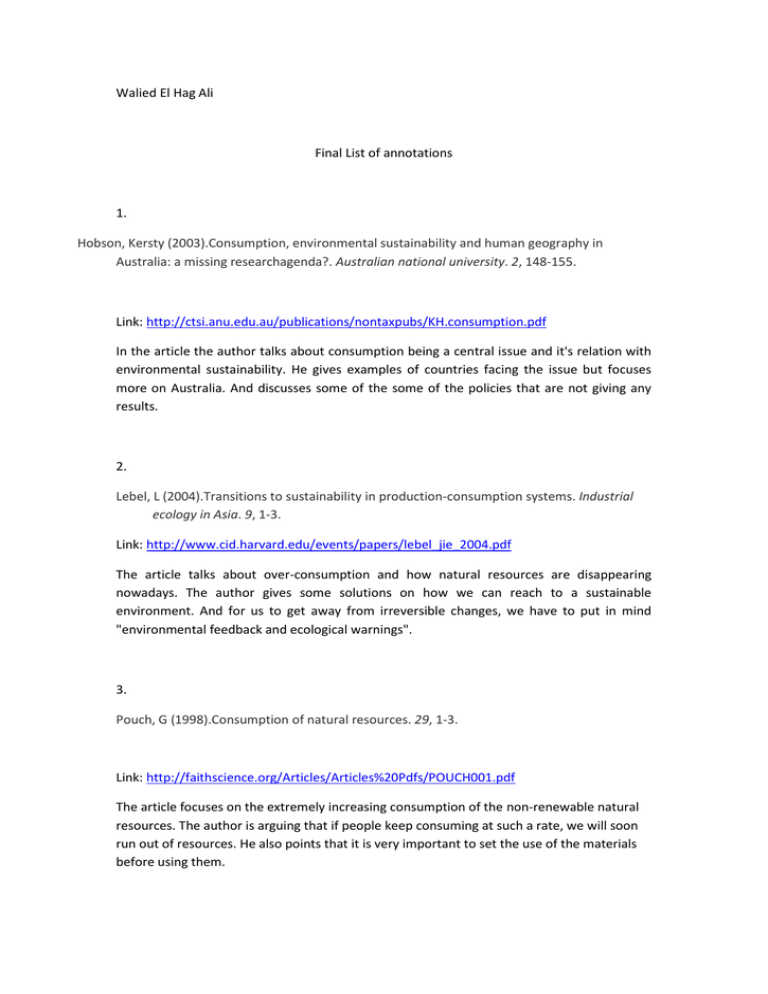
Walied El Hag Ali Final List of annotations 1. Hobson, Kersty (2003).Consumption, environmental sustainability and human geography in Australia: a missing researchagenda?. Australian national university. 2, 148-155. Link: http://ctsi.anu.edu.au/publications/nontaxpubs/KH.consumption.pdf In the article the author talks about consumption being a central issue and it's relation with environmental sustainability. He gives examples of countries facing the issue but focuses more on Australia. And discusses some of the some of the policies that are not giving any results. 2. Lebel, L (2004).Transitions to sustainability in production-consumption systems. Industrial ecology in Asia. 9, 1-3. Link: http://www.cid.harvard.edu/events/papers/lebel_jie_2004.pdf The article talks about over-consumption and how natural resources are disappearing nowadays. The author gives some solutions on how we can reach to a sustainable environment. And for us to get away from irreversible changes, we have to put in mind "environmental feedback and ecological warnings". 3. Pouch, G (1998).Consumption of natural resources. 29, 1-3. Link: http://faithscience.org/Articles/Articles%20Pdfs/POUCH001.pdf The article focuses on the extremely increasing consumption of the non-renewable natural resources. The author is arguing that if people keep consuming at such a rate, we will soon run out of resources. He also points that it is very important to set the use of the materials before using them. 4. Raven, P. Population and natural resources. 43-46. Link: http://atlas.aaas.org/index.php?part=2 The article on this website basically talks about America as "the world's largest consumer in absolute terms". The relationship between the growing population and natural resources. It as well presents some solutions for consumption, such as recycling, which governments are recently trying to implement. 5. Dixon, T (1994).Environmental scarcities and violent conflict. International security. 19, 5-40. Link: http://www.jstor.org/pss/2539147 The author talks as well about the relationship between consuming resources and the number of population that is increasing day by day. And he also talks about the effects of over-consuming on the upcoming generations. 6. Arrow, K, Dasgupta, P, Goulder, L, Daily, G, Ehrlich, P, Heal, G, Levin, S, Maler, K, Schneider, S, Starrett, D, Walker, B (2004). Are we consuming too much?. The Journal of Economic Perspectives. 18, 147-172. Link: http://www.jstor.org/stable/pdfplus/3216811.pdf In the article, the authors argue about whether humans are consuming too much of natural resources or not. They say that in order for us to determine whether our consumption is excessive or not, we should relate it to sustainability. And as well, we should recognize the economic and ecological domains of the problem. They also differentiate between poor and rich countries in terms of what can be excessive consumptions or not. 7. Chancellor, W, & Goss, J (1976). Balancing energy and food Ppoduction, 1975-2000. Science, New Series. 192, 213-218. Link: http://www.jstor.org/stable/pdfplus/1741104.pdf The article discusses several factors which will be causing the world consumption to increase, such as population. And so, as it increases, the energy needed per capita will highly increase. The use of fertilizers will also increase in the future, and we should focus on it in order to keep food production stable. 8. Farias, C., & Farias, G.. (2008). Cycles of Poverty and Consumption: The Sustainability Dilemma. Competition Forum, 6(2), 338-344. Retrieved October 21, 2009, from ABI/INFORM Global. (Document ID: 1601098711). Link: http://proquest.umi.com/pqdweb?index=2&did=6829049&SrchMode=1&sid=3&Fmt=3&VIn st=PROD&VType=PQD&RQT=309&VName=PQD&TS=1256114007&clientId=3259 The article shows a demographic and macro-economic overview of present and future trends in energy consumption and energy costs as well. It takes OPEC as an example, because it controls 77% of the worlds' oil reserves. It also shows some effects of political actions on Oil. 9. Karu, V, Vastrik, A, & Valgma, I (June 2008). Application of modelling tools in Estonian oil shale mining area.(Report). Oil Shale, 25, 2. p.135(10). Retrieved October 21, 2009 Link: http://jmk.sagepub.com/cgi/reprint/25/1/76 The authors in this article discuss the idea of sustainable consumption. It shows the differences between individual consumers according to the place in which they live in. The two authors also present two broadly different perspectives about consumption. 10. M, Vincent (2006). Liquid assets: why water could become more precious than oil.The Spectator. Retrieved October 21, 2009, from Research Library Core. Link: http://proquest.umi.com/pqdweb?index=11&did=1123766611&SrchMode=1&sid=6&Fmt=3 &VInst=PROD&VType=PQD&RQT=309&VName=PQD&TS=1256114414&clientId=3259 The author talks about how the demand and consumption of water is increasing. And he discusses the fact that water is becoming too costly to extract and transport, and even compares it with oil. He also talks about something called Evain effect which is basically, when people use water insufficiently, while other people around the world go thirsty. 11. Weinstein, M, & Zeckhauser, R (1975). The optimal consumption of depletable natural resources. The Quarterly Journal of Economics. 89, 371-392. Link: http://www.jstor.org/stable/pdfplus/1885258.pdf The source talks about how the world is facing an “energy crisis” out of over-consuming. The crisis is caused because of the economic system in which we use these days, which requires us to consume more and more. The article gives an example of how governments are attempting to reduce the overuse of resources by applying some policies and laws. 12. Dolan, P (2002).The sustainability of "sustainable consumption". Journal of Macromarketing. Link: http://jmk.sagepub.com/cgi/reprint/22/2/170 The purpose of this article is to find out whether we as human beings can reach "sustainable consumption" or not. But the goal is actually to discuss the ways in which we can solve our problems in consumption. Then the article reviews some of the habits of consumption that humans have, such as being careless sometimes, and argues whether it is useful for us or is it just a waste. 13. Conca, K, Princen, T, & Maniates, M (2002). Confronting consumption.Asco Typesetters. Link:http://books.google.com/books?hl=en&lr=&id=L95ICsAoFIYC&oi=fnd&pg=PP11&dq=over+co nsuming+environmental+resources&ots=vjahvKNCrV&sig=uKcdnaGHO7yYn_P_eZcwbwQMDP0# v=onepage&q=over%20consuming%20environmental%20resources&f=false This book talks about how we should think about consumption and decide whether it is bad for the environment or not. We should think about it in many ways, in terms of "social, political, and cultural" problems. It also introduces the term "green consumption", which refers to consuming resources effectively. 14. Farias, C., & Farias, G.. (2008). Cycles of Poverty and Consumption: The Sustainability Dilemma. Competition Forum, 6(2), 338-344. Retrieved October 21, 2009, from ABI/INFORM Global. (Document ID: 1601098711). Link:http://proquest.umi.com/pqdweb?index=10&did=1601098711&SrchMode=1&sid=9&F mt=4&VInst=PROD&VType=PQD&RQT=309&VName=PQD&TS=1256115070&clientId=3259 This book is discussing all the environmental threats that the world is facing. It also talks about the significance of consumption and its causes, which includes losing environmental sustainability. Plus, it's discussing how it is important to control the environmental impact of consumption. 15. Stern, P (1997). Environmentally significant consumption. Washington: National academy of sciences. Link: http://books.google.com/books?hl=en&lr=&id=qzRGrJgr_cC&oi=fnd&pg=PA12&dq=consumption+of+environmental+sources&ots=GELYyjvIY&sig=ZeE6rSDqBpO5JXVg2dQw5xEdcDg#v=onepage&q=consumption%20of%20environme ntal%20sources&f=false This book is discussing all the environmental threats that the world is facing. It also talks about the significance of consumption and its causes . Plus its discussing how important to control the environmental impact of consumption. The author has also defined consumption as “the impact of the average person on the environment” which he defines as an analytic problem and he is also mentioning how to improve the knowledge of consumption.
